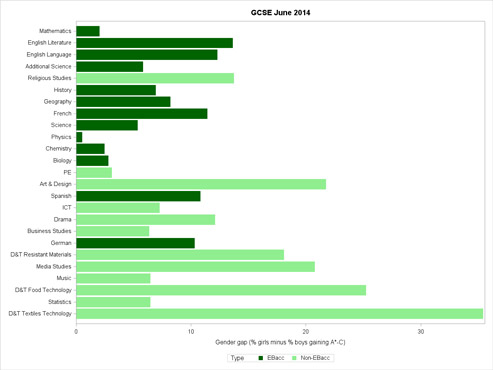Simon Lebus looks for answers within a new linguistic study charting the UK’s growing obsession with education and reveals some surprising stats around the gender gap at GCSE.
As the new term starts and the autumn weather closes in, newspapers are full of back to school stories. The policy debate is also hotting up, with Labour announcing a commitment to abolish academies and continue discussion about the exam system. The late Mike Baker, the BBC's education correspondent for many years, once gave an interesting talk in which he related the increase in the amount of press coverage of exam results from the 1970s onwards, noting that there was virtually zero interest to begin with but that coverage increased rapidly from 1990 onwards. Interestingly, a new study by researchers from Cambridge University Press and Lancaster University reveals that education also features more frequently in everyday conversation. Comparing a 1990s data set with recordings of present day conversations, they identify that ‘education’ crops up 42 times per million words compared with only 26 times per million in the 1990s.
What could be behind this? The answer may lie in another finding of the research in which it was identified that we've also started talking in particular about qualifications twice as much as in the 1990s, with GCSEs in particular featuring five times more in the contemporary conversations that were analysed.
One potential explanation for this is the impact of globalisation; another is the general decline in levels of trust in public institutions. The impact of both of these has been to increase the importance of formal, externally validated qualifications. As people have more varied careers and very often pursue employment opportunities across national borders it becomes more important for them to have formal certification that employers understand and that those employers can equate with consistent and well-established skill levels. It is also true that we are less ready as a society to rely on non-externally validated professional judgement, as a result of which certification of learning and skills levels relying purely on internal school and teacher reporting is as a rule often less well-trusted than externally awarded qualifications.
Another possible explanation for this increase in the number of conversations featuring education is the simple fact that more people stay in education longer, a consequence of a societal change that has occurred in most industrial economies and which has been supported by a doubling in the amount of public spending on education (see
www.parliament.uk/briefing-papers/SN01078.pdf ).
The same period has also seen a huge shift in gender attainment at GCSE across a wide range of subjects. My colleagues Tom Bramley and Carmen Vidal Rodeiro in our Research Division recently produced a graphic showing the difference between the percentage of girls gaining grade C or above and the percentage of boys achieving the same grades in a wide range of GCSE subjects. The proportion of girls gaining A* to C grades was higher in all subjects shown in the graph and in particular, right across the range of Ebacc subjects, which are shown in the darker green colour. The difference was not as striking in maths and physics but was still there; an interesting outcome given concerns about the number of female students pursuing STEM subjects in higher education, and which poses the question of what is happening to these superior performing 16 year old girls between GCSE and when they go to University, as this represents a significant loss of opportunity and human capital both for the country as a whole and those individuals involved.

This and other interesting questions to do with gender differences in education will be discussed at our conference on October 29th in London, where we will welcome representatives from education ministries in Mauritius and Swaziland and which will be filmed for the benefit of our international audience.
Simon Lebus
Group Chief Executive, Cambridge Assessment
Read more about the Gender gap graph in the attached PDF below. Related materials